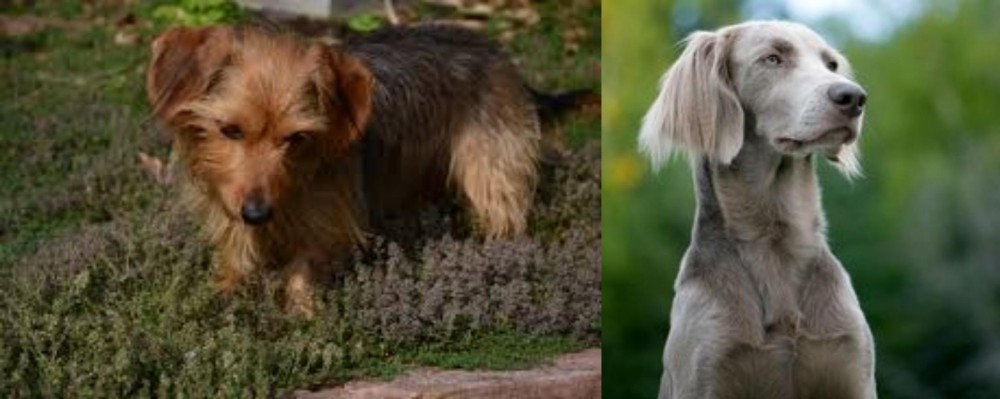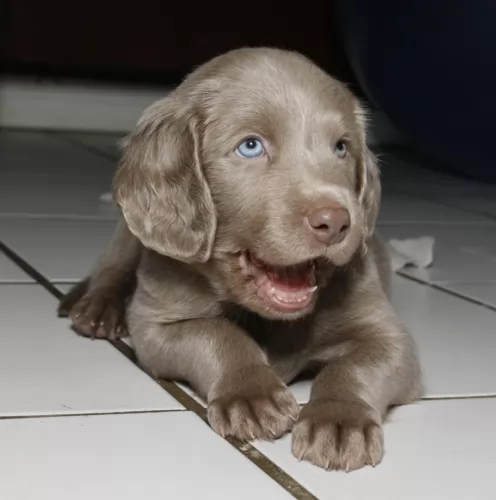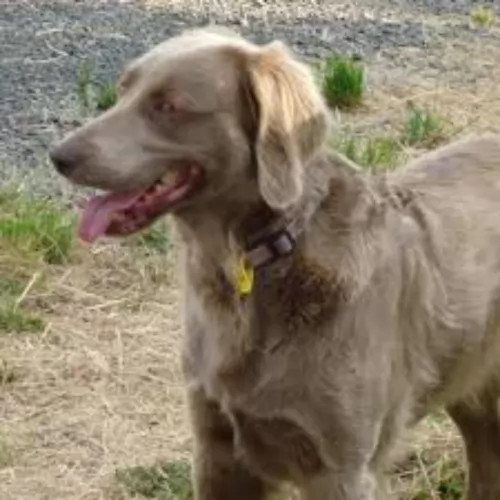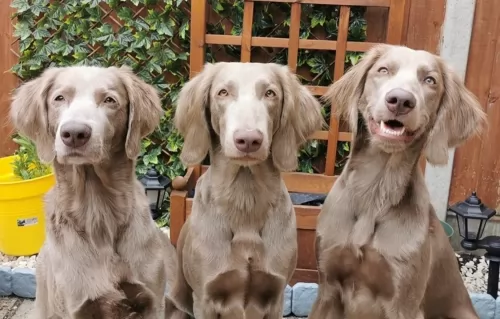 Petzlover
Petzlover Dorkie is originated from United States but Longhaired Weimaraner is originated from Germany. Dorkie may grow 47 cm / 18 inches shorter than Longhaired Weimaraner. Dorkie may weigh 34 kg / 74 pounds lesser than Longhaired Weimaraner. Both Dorkie and Longhaired Weimaraner has almost same life span. Dorkie may have less litter size than Longhaired Weimaraner. Dorkie requires Low Maintenance. But Longhaired Weimaraner requires Moderate Maintenance
Dorkie is originated from United States but Longhaired Weimaraner is originated from Germany. Dorkie may grow 47 cm / 18 inches shorter than Longhaired Weimaraner. Dorkie may weigh 34 kg / 74 pounds lesser than Longhaired Weimaraner. Both Dorkie and Longhaired Weimaraner has almost same life span. Dorkie may have less litter size than Longhaired Weimaraner. Dorkie requires Low Maintenance. But Longhaired Weimaraner requires Moderate Maintenance
 Dorkie Terriers originate from the United States of America. The small Dorkie, a cross between the Dachshund and the Yorkshire Terrier has a short history, unlike the two dog breeds that were bred to bring him about.
Dorkie Terriers originate from the United States of America. The small Dorkie, a cross between the Dachshund and the Yorkshire Terrier has a short history, unlike the two dog breeds that were bred to bring him about.
These dog breeds were both used for hunting small animals but the Dorkie today is essentially a companion dog. The International Designer Canine Association started recording registration of the Dorkie from 2009.
 You may be used to the sleek, silver shorthaired Weimaraner, but did you know you get a beautiful long haired version too? Known also as the Long Coated Weimaraner or the ‘Gray Ghost’, with its mesmerising amber eyes, the less common long haired variety shares a similar history as the more familiar short haired version.
You may be used to the sleek, silver shorthaired Weimaraner, but did you know you get a beautiful long haired version too? Known also as the Long Coated Weimaraner or the ‘Gray Ghost’, with its mesmerising amber eyes, the less common long haired variety shares a similar history as the more familiar short haired version.
The dog originates in Germany and was developed to be a hunting dog. It is believed that the silver dog dates back to the early 1800’s, and in 1897 the first breed club in Germany was formed to protect the future of this dog.
The longhair coat is recognized in all countries except the American Kennel Club.
 The Dorkie is a small hybrid breed standing at 13 – 23cm in height and weighing 2 – 6kg. The Dorkie mostly comes with long, straight hair but there are however Dorkies who have the short hair of the Dachshund.
The Dorkie is a small hybrid breed standing at 13 – 23cm in height and weighing 2 – 6kg. The Dorkie mostly comes with long, straight hair but there are however Dorkies who have the short hair of the Dachshund.
The Dorkie is hypoallergenic, making them the ideal pet for allergy sufferers. They have floppy ears, a long body and short legs. The tail is long and furry. Most times they come in the Yorkshire Terrier colors of black and tan, but this can also vary.
The Dorkie is a loving, loyal, happy little dog who makes an excellent family dog. Although he isn’t looked upon as your typical lap dog, it is what he is really, as he loves nothing more than to be curling up on your lap or as close to you as he can get.
He loves spending time with his human family and is a social, extrovert kind of dog. Because he is also alert, he will do a good job of alerting his family to danger. He is good with children, but because of his smallness, rough children will need to be careful in rough and tumble games as he could get injured.
Even with a small dog like this, he will need training and socialization otherwise he can become a yapper, which comes from the Dachshund side. Training makes him obedient and relaxed around visitors in the home, and because he is an intelligent breed, he is easy to train and is a great dog for first time dog owners.
 The Longhair Weimaraner with its eye-catching grey coat is a large dog that stands between 58 and 70cm and weighs between 25 to 40kg.
The Longhair Weimaraner with its eye-catching grey coat is a large dog that stands between 58 and 70cm and weighs between 25 to 40kg.
These dogs, unlike the short haired version, have the tail traditionally long and the tail is feathered. The eyes are a blue-green, amber or grey color. The grey coat is soft and silky and even though it is quite long, a brush twice a week will keep it in tip-top condition.
The Longhaired Weimaraner’s temperament is the same as the short haired variety. He is also a superb field dog with excellent hunting skills.
They’re very active dogs, looking for plenty of mental and physical stimulation. For first-time dog owners, this might prove to be too demanding, so the long haired Weimaraner might not be the best first-choice dog to get.
They can be aggressive when meeting new people and he will certainly require training and socialization if you want him to be calm and obedient.
 Dorkies are easy going little dogs and adapt easily to life in the city or in the country.
Dorkies are easy going little dogs and adapt easily to life in the city or in the country.
Ideally they are inside dogs, feeling happy and content around their human family. They love adults and children and will get on well with other pets in the home too.
They are quite active little dogs and will thrive on games inside the home or outside in the garden. He may be small, but you can put him on a leash and take him for walks.
They make excellent pets and are only too happy to become a devoted and loyal family member of yours.
 Your Long Haired Weimaraner is a friendly, alert dog that makes for an excellent companion and watchdog. The fact that he is also restless, confident, independent and strong-willed means that training and socialization will be necessary to make him pleasant and obedient.
Your Long Haired Weimaraner is a friendly, alert dog that makes for an excellent companion and watchdog. The fact that he is also restless, confident, independent and strong-willed means that training and socialization will be necessary to make him pleasant and obedient.
You can’t always count on him to be amicable as he also has a bit of an aggressive side.
The way your Long Haired Weimaraner turns out will depend on heredity, the personality of the owner as well as training and socialization.
These dogs want to be with their human family and will follow the owner around and contentedly lie at their feet. Once he's trained, the Weimaraner is guaranteed to make you a fine family companion.
 The Dorkie, being a cross-breed, is a healthy dog and with good care can live t be 10 – 13 years of age. Nonetheless he is still prone to genetic problems and he can inherit traits from both parents.
The Dorkie, being a cross-breed, is a healthy dog and with good care can live t be 10 – 13 years of age. Nonetheless he is still prone to genetic problems and he can inherit traits from both parents.
A healthy diet will be needed to maintain the Dorkie’s health. You don’t want to overfeed your Dorkie, more so because he is a small dog.
The way you feed a dog can have a massive impact on his health and longevity. Just remember that a dog that is obese will battle to exercise, but also obesity can result in serious health problems, putting strain on the bones and joints too.
You don’t want to feed your dog day after day with kibble, and adding in some cooked rice, vegetables and chicken can just give him a more varied diet. Raw meat can also be included from time to time. Always ensure that there is fresh, cool water available to him.
The most common symptoms of an allergy is skin irritation – your pet will be constantly scratching and licking. Some skin conditions with your Dorkie can be cleared up quickly while some might be so severe as to require lifelong treatment.
 Hip Dysplasia is a medical threat to all dog breeds and fortunately the Weimaraner is a dog breed that has a low rate of dysplasia. When buying a Long Haired Weimaraner, try and get one from breeders who have had their breeding dogs hip-tested.
Hip Dysplasia is a medical threat to all dog breeds and fortunately the Weimaraner is a dog breed that has a low rate of dysplasia. When buying a Long Haired Weimaraner, try and get one from breeders who have had their breeding dogs hip-tested.
You’ll notice that the Weimaraner is a deep-chested dog and he is prone to bloating, which can turn out to be life threatening for your dog if not treated immediately.
The stomach twists and is swollen with no bowel movements. The dog is restless and in distress and needs immediate attention. To help, instead of giving one large meal which is gobbled up quickly, give him 2 smaller meals.
Skin allergies are also quite common in these dogs and you don’t want your silver dogs coat going off as it is his crowning glory.
If he is scratching, his skin is dry, red and itchy, get him to the vet as it can even be parasites at work, causing an allergic reaction.
 What you feed your pet can play an important role in managing health and skin conditions. Speak to your vet about special quality dog foods that can help reduce skin conditions and other nasty reactions to common, unhealthy food ingredients.
What you feed your pet can play an important role in managing health and skin conditions. Speak to your vet about special quality dog foods that can help reduce skin conditions and other nasty reactions to common, unhealthy food ingredients.
Dorkies are very low maintenance dogs, and they will require a brushing every 2 weeks. Those with longer coats may require some professional grooming. Check their teeth regularly and brush them 2 or 3 times a week. The occasional nail clipping may also be required.
 When you bring a Long Haired Weimaraner home, you will need to invest in brush and comb for his long hair. They’re active dogs and love nothing more than running in a field, rolling in mud and being very active.
When you bring a Long Haired Weimaraner home, you will need to invest in brush and comb for his long hair. They’re active dogs and love nothing more than running in a field, rolling in mud and being very active.
His coat will need to be brushed at least twice a week to keep it looking silvery and shimmering. Check the ears, eyes and teeth whenever you brush him and get used to cleaning his teeth regularly too.
If in doubt about how to keep your pet well groomed in terms of looks and health, speak to a dog expert, your vet or professional groomer.
Your ‘Gray Ghost’ dog has been a very successful hunting dog, and they are high-energy gun dogs. As a large dog he will have particular nutritional needs to fuel his energetic lifestyle.The dog’s high activity levels need to be taken into account when looking at his diet.
Buy the best commercially manufactured food. Add to his kibble some cooked chicken, brown rice or pasta and cooked or raw vegetables from time to time as well as bits of raw meat. Your dog will thank you for keeping his meals simple but nutritious.